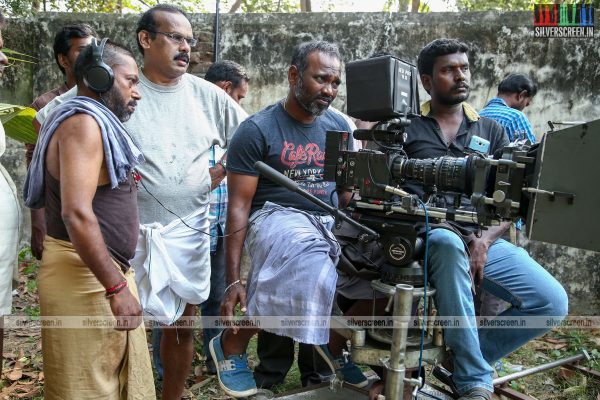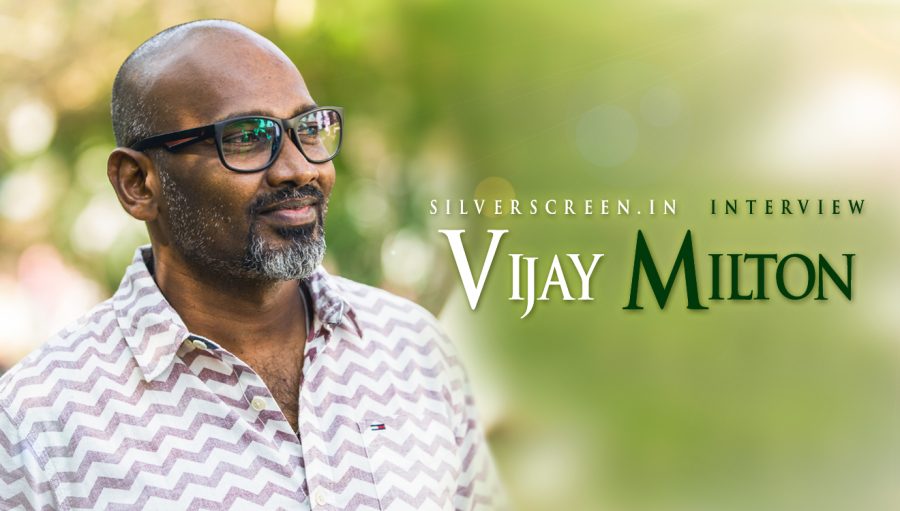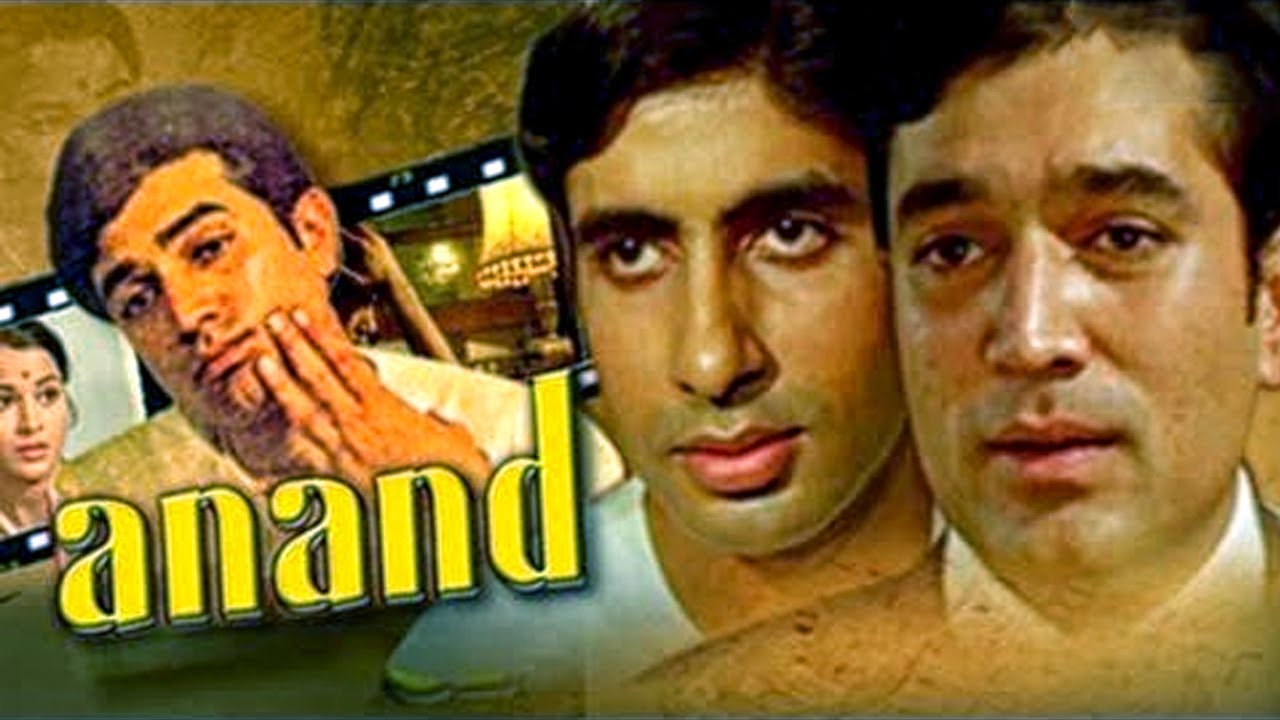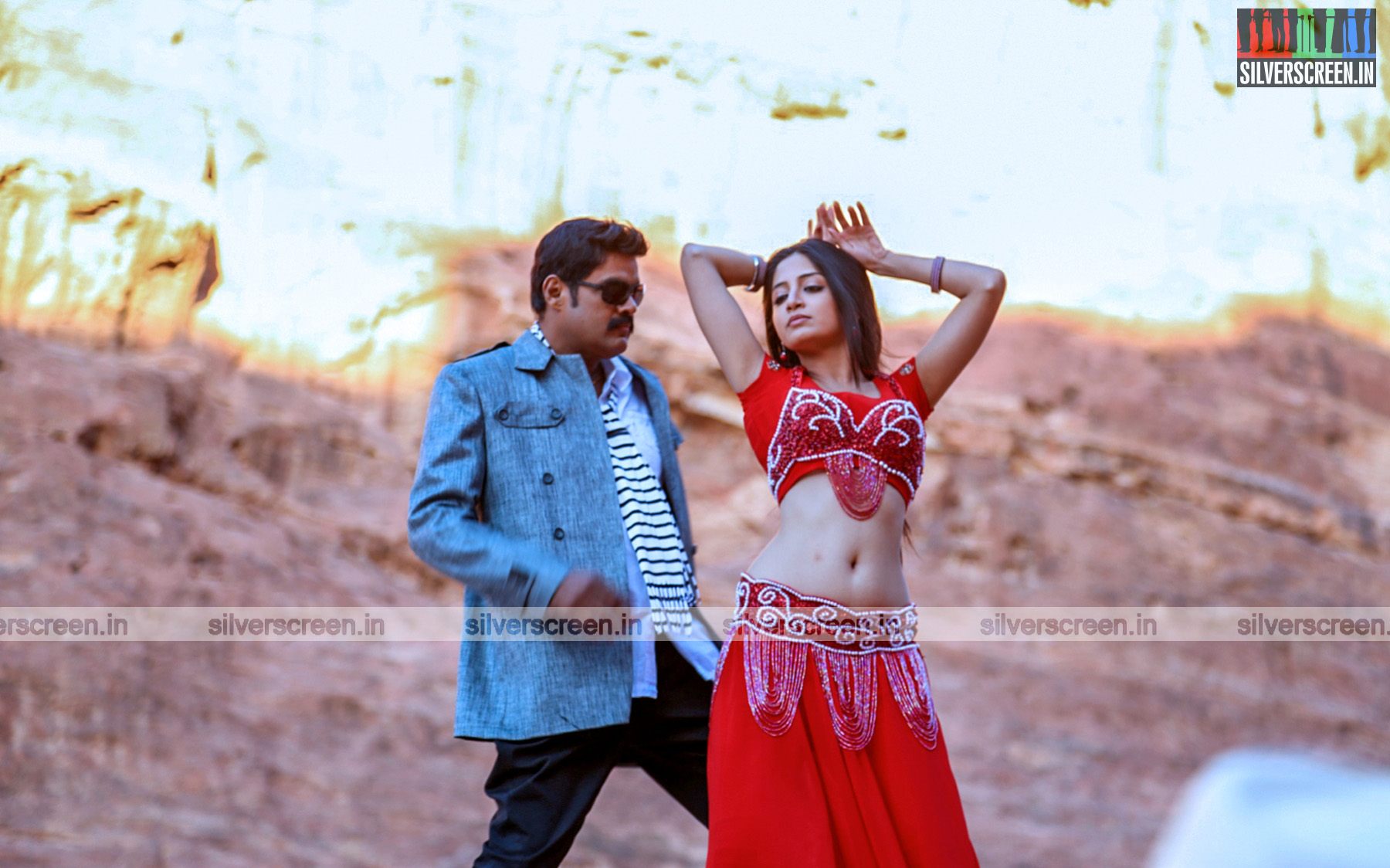The way we tell a story has to evolve sometime, cinematographer-turned-director Milton says. Awaiting the release of his fourth directorial – Kadugu – tomorrow, and known for his offbeat camera-work in Kadhal and Vazhakku Enn 18/9, Milton is seasoned enough to be equipped for any cinematographical emergency. For instance, he’s always armed with a couple of tubelights during shoot – just in case all else fails.
Vijay Milton loves to observe. Little, seemingly irrelevant details. Even people.
Mostly people.
Award shows are his favourite. Because, there’s a standard greeting etiquette followed by the PRs, he says. “The PR would greet the director and actors enthusiastically, while the AD would mostly pass unnoticed – with a casual ‘hello’.”
This would bother him a lot.
“In my team, everyone’s of equal importance,” he declares. “There’s no room for different treatment.”
*****
Milton isn’t around when I arrive at his Chinna Porur office for our interview. His team is, though – flying around the office, gadgets in hand. A couple of them, covered in wires, are welding something.
I chat up Sridhar, an Assistant Director who has been with Milton for a long time. Filming Vana Yuddham – a biopic on slain forest brigand Veerappan is his favourite memory. “We shot at the same place, same forest where Veerappan used to live. After five months of constant shooting in this dense forest, fending off insects, carrying our equipment around with an occasional elephant passing by, it felt like we were so disconnected with the world outside. We had no reception on our phones either, so we had to use walkie-talkies,” Sridhar says.
Vana Yuddham, incidentally, ran into controversy when Veerappan’s wife, Muthu Lakshmi, filed a case in early 2013 to stop the film’s exhibition. She said it would affect the life of their daughters. The movie only released after the Supreme Court ordered the makers of Vana Yuddham to pay her compensation of Rs 25 lakhs.
*****
Charles, a shy 24-year-old – is a recent recruit in Milton’s team of 15. He got to know about the vacancy in Milton’s office on Facebook – and is currently assisting the cinematographer-turned-director on his upcoming film, Aan Devadai.
He’s always up to something, Charles says of Milton. “He never sits still.”
Soon, a rather familiar face walks into the office: Milton’s younger brother – Bharath. An AD on a regular day, but also the actor in Kadugu (releasing this Friday), Bharath confesses that his brother is not the easiest person to work with. They are nine years apart. “My brother wants things his way. So whenever he reprimands me, I don’t take it to heart. On sets, he’s my director and I’m his actor. At home, we’re brothers. We switch back and forth,” he says.
As kids, too, the older Milton boy always had a keen eye for films, watching his father, S Vijayaraj. Bharath followed suit. “We look up to our father,” Bharath adds, “He’s been a big inspiration for the two of us.”
The only two movies that their father made though, never saw the light of day.
*****
Twenty minutes later, there’s still no sign of Vijay Milton. The ADs signal me over to the other office. A few blocks down the road, it turns out to be the office of Rough Notes – the logo a discernible scribble – a production company run by Vijay Milton and a few other producers.
It has a couple of rooms, a dubbing studio that still smells of fresh paint, and a small kitchen, out of which wafts the steamy, heady scent of freshly-brewed green tea.
I’m handed a cup. It has honey.
*****
Vijay Milton’s tryst with cinema began as a crew member in his father’s unit.
(He arrives just when I’m sipping my tea – in spotless white.)
Pic: nagraaudio.com
He was 14, and was in charge of recording dialogue. “These days, people use the Nagra recorder. Back then, we used a two-in-one tape recorder. A special person would be hired to do just that. Stand as close to the artistes as possible to record – but they cannot be seen in the frame,” he says.
Milton was that special person. He was recording the pilot song for his father’s second film.
He inherited his love for movies from his father – and the love soon took him to the lone film institute in Chennai during the ’90s – which only offered a course in cinematography for someone who’d completed Class 12.
His heart though, was set on direction.
Azhagai Irukkirai Bayamai Irukkirathu (2006) was Milton’s first directorial. Starring Bharath and Mallika Kapoor, it was a box-office failure – a love triangle that just wasn’t good enough. Goli Soda (2014) – set in the Koyambedu market, about a bunch of carefree boys who decide to start a mess – happened after a brief hiatus, and it continues to be regarded as one of his best works.
*****
There’s a bit of me in every story I make, Milton says.
He was in Class 2 when his father took him to the library to get a membership. “But the librarian said I was too young to be a member. My father insisted. When you read a story, you live someone else’s life. That way, I know I’ve lived a 100 lives, and whenever I come up with a tale, I know it’s going to have something about someone I know or have read about.”
His father is his biggest critic, and Milton simply adores him. “He was my hero,” Milton says, “he would do push-ups at home, and would ride a Bullet – during those days, it wasn’t very common, and made him look ridiculously cool.”
Also, a film would do well if his father doesn’t like it, Milton laughs. “When everyone claps and cheers at the theatre, he would be standing expressionless. At home later, he’d tell me something appears incomplete in the film. Even if it does well.”
In Kadugu – which Milton calls “his anger at the society” – he cast T Rajender in a pivotal role. Everyone seemed to like it, except his father. “He somehow knew TR wouldn’t work. When actor Rajakumaran took over, everyone was against the casting, they wanted to know why I can’t cast a young actor who could wear a wig and white beard, or someone older like Sarath Kumar. My father was the only person who liked Rajakumaran. But after seeing the rushes, there was appreciation from all quarters.”
Even when Goli Soda was being filmed, “I was questioned on my casting choice – people said I must go for a much younger protagonist or an adult as a 14-year-old kid would appeal to neither adults not kids.”
*****
Vazhakku En 18/9, director Balaji Sakthivel’s fourth film after a couple of duds – and Kadhal (starring Bharath and Sandhya) – was a critical success.
Milton shot it on a digital still camera – a Canon EOS 7D with Optima movie lenses.
It’s a funny thing, laughs Milton. “Back then, many were apprehensive about using a digital camera. But the way we tell a story has to evolve sometime. I shot the movie on the 5D and 7D cameras – which is viewed as a risk in cinematography. They were mainly used for short films. My friends told me to do it on a regular camera, but by God’s grace, the stills were good.”
Cinematographers certainly have it easy with technology – but quite a lot, says Milton, can be achieved naturally too.
In Vizhithiru‘s case, it was circumstantial lighting. “It’s a set of events that unfold one night, so while we couldn’t rely on natural light for it, we did need some throughout. I suggested to the director that we shoot on Karthigai Deepam night. That way, there are serial lights and lamps everywhere, with the occasional firework in the sky. We also used car headlights, and I always have two tube-lights with me,” he grins.
And then, there are other tricks to get a shot right. But the one that is often used, and is still relevant is the old chewing-gum trick. If someone isn’t very good with their dialogue – especially when the heroines don’t know Tamil – they chew gum. The rest is taken care of during post-production. “We’ll look at their lips, and fit the dialogue accordingly,” Milton laughs.
*****

A good director needs great camera-vision, too. It’s something that goes with the territory, Milton says. Also of importance is the cinematographer-director relationship – when that turns sour, Milton quits. Simple as that.
The filming of Autograph (2004) was marked in that way. Quite a lot of disagreements with director Cheran, whom Milton considers a close friend. In an interview with Jaya TV three years ago, Milton says Cheran’s thoughts, and even his taste in books, mirror his. So when Cheran proposed that he join the team as a cinematographer, Milton was thrilled. “I thought this was going to be a terrific team,” he says in the interview, “but right on the first day of filming, we’d begun fighting.”
Cheran was almost over the edge at that time, Milton explains to the host. Autograph was his own production, and the director himself had to star in the film because no other actor would. “It was risky in all aspects. But Cheran did not want to compromise.”
Recommended
I had an issue with Cheran staying in his comfort zone, Milton tells me. “It isn’t easy especially when it had worked well before. We fought over the Kerala sequences in the film. The film had four looks, and had four cinematographers for each. Some scenes do not have certain colours, and some were only wide-angle shots while others were shot only using pastel colours.”
It took them 65 days to shoot the Kerala sequences – which had to be in only yellow and green, with no hint of red. Also, the scenes needed to have a dull, wet look about them. Milton recalls that the crew would hose the sets before each scene. They even had to hose those huge coconut trees. “It was peak summer in Kerala, and before we could wrap up a shot, the sets would become dry,” he laughs.
(Kerala scenes from 44:00)
*****
Kadhal had a positive ending, Milton says in the 2014 interview. The hero was supposed to raze down everyone, and lead the heroine out. But the ‘look’ of the movie was finalised the instant director Balaji Sakhthivel saw the photograph of actor ‘Kadhal’ Dhandapani – who was a businessman in Dindigul then.
(Source: moviegalleri.net)
Balaji’s crew had shot a few pictures of the location – Dhandapani’s office – and along with that, they had snapped a shot of him. Dhandapani sat hunched over a very dirty table in the picture, beside photographs of his favourite deities – all smeared in sandal. “The photo was very natural,” Milton says, “the setting very rustic, the table very untidy. And Balaji wanted to cast him as the girl’s father. That instant decided the mood of the film.”
Dhandapani, who passed away in 2014 after a cardiac arrest (a decade after entering cinema), was camera-shy; so Milton had to pretend to fix his camera when the actor delivered his lines – when, in, reality, the cinematographer was at work, experimenting with different angles, positioning the eye of the camera between fan blades, and tuning the actor out of focus so that only the silhouette could be seen, and the voice heard.
“Casting him was a risky yet brave choice,” Milton tells me, “because, he had marks all over his face. But that probably only made it look more natural.”
Balu Mahendra, Milton recalls in the Jaya TV interview, had wanted to know the kind of lighting Milton used for Kadhal.
“None,” Milton had replied.
“I can see that,” the veteran filmmaker had said. With tears in his eyes.
*****
The Vijay Milton interview is a Silverscreen exclusive.



